人教版(2019)选择性必修第四册Unit 4 Sharing Reading and Thinking 课件(共37张PPT)
文档属性
| 名称 | 人教版(2019)选择性必修第四册Unit 4 Sharing Reading and Thinking 课件(共37张PPT) | 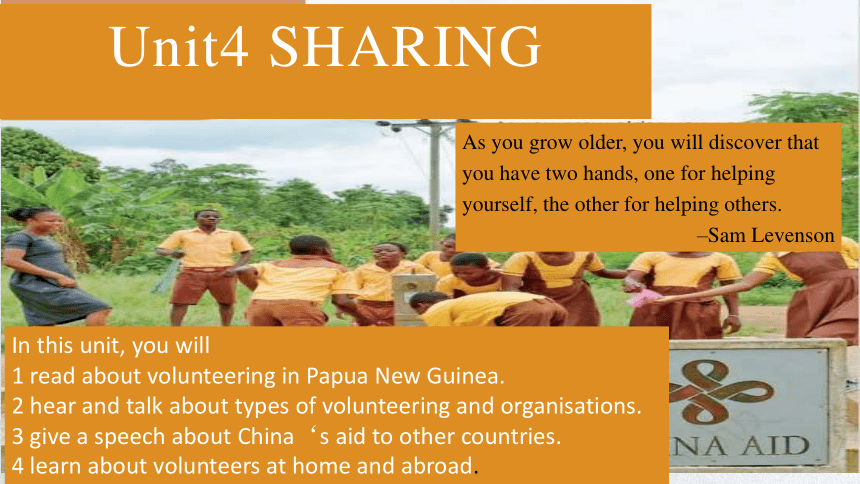 | |
| 格式 | pptx | ||
| 文件大小 | 10.0MB | ||
| 资源类型 | 教案 | ||
| 版本资源 | 人教版(2019) | ||
| 科目 | 英语 | ||
| 更新时间 | 2024-05-28 17:19:11 | ||
图片预览

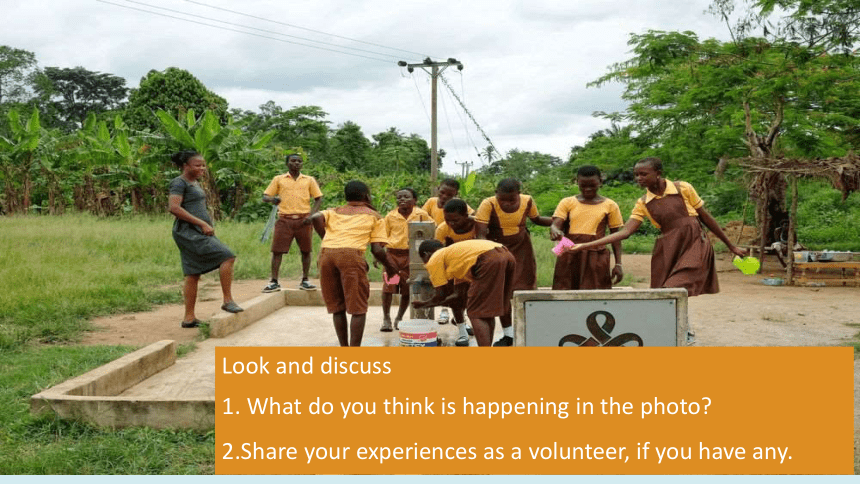
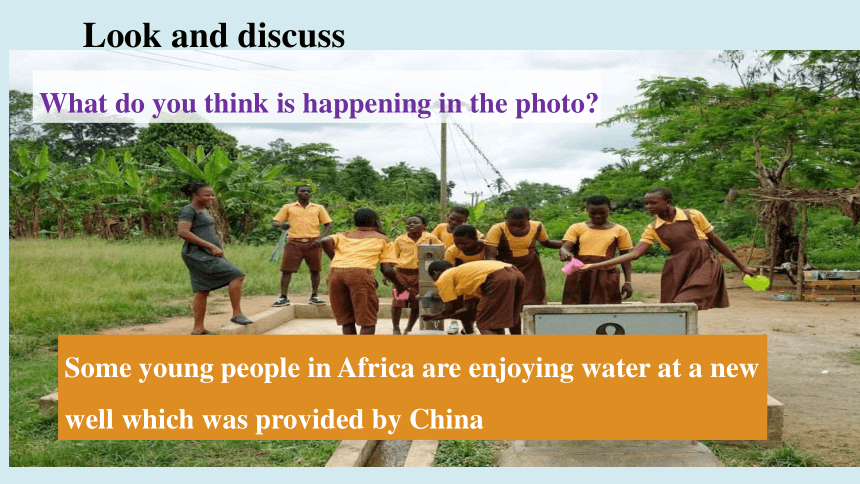
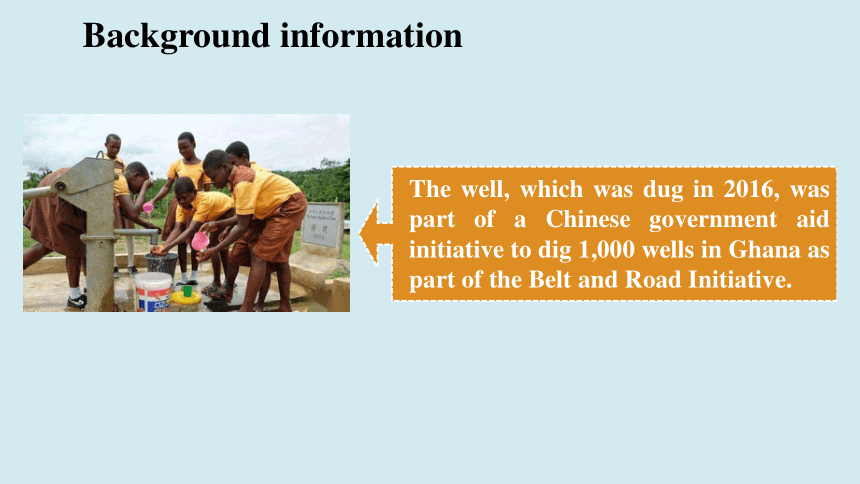
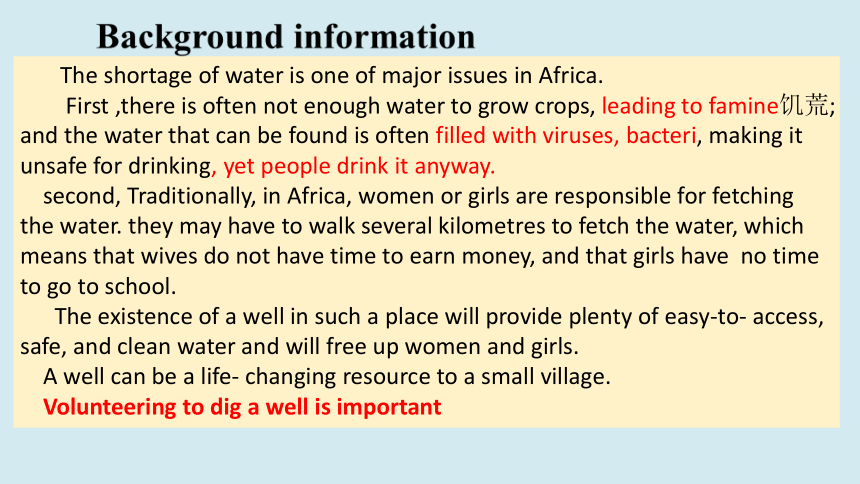
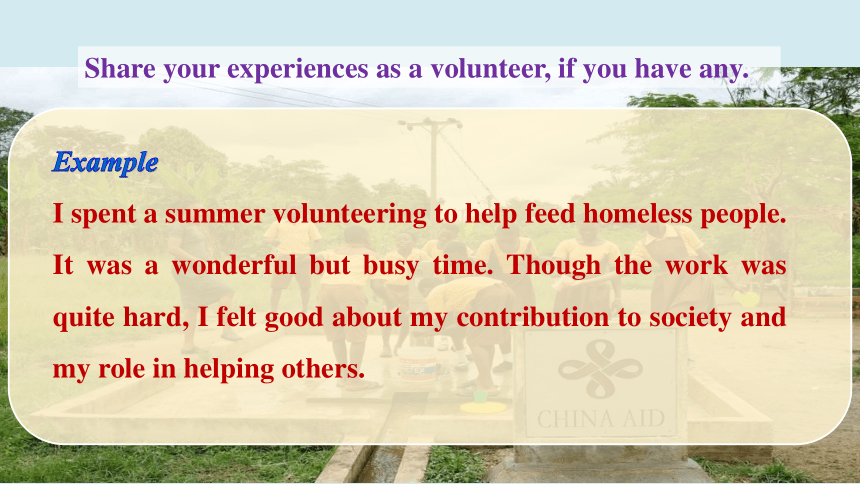
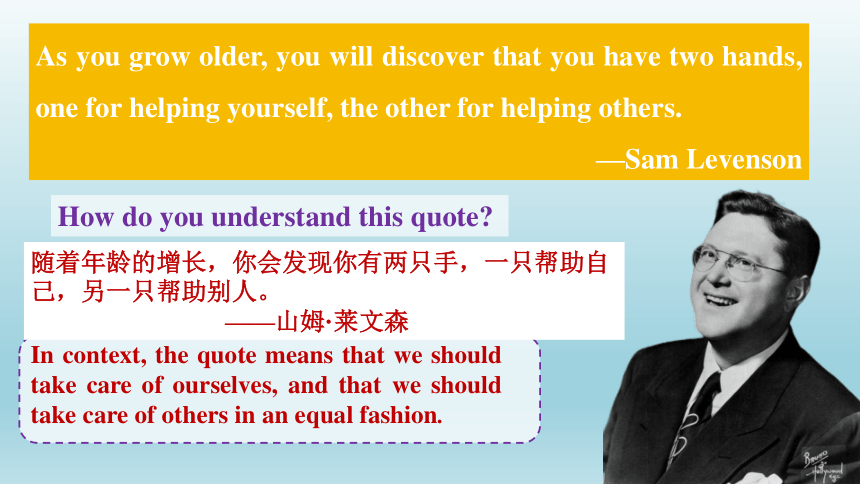
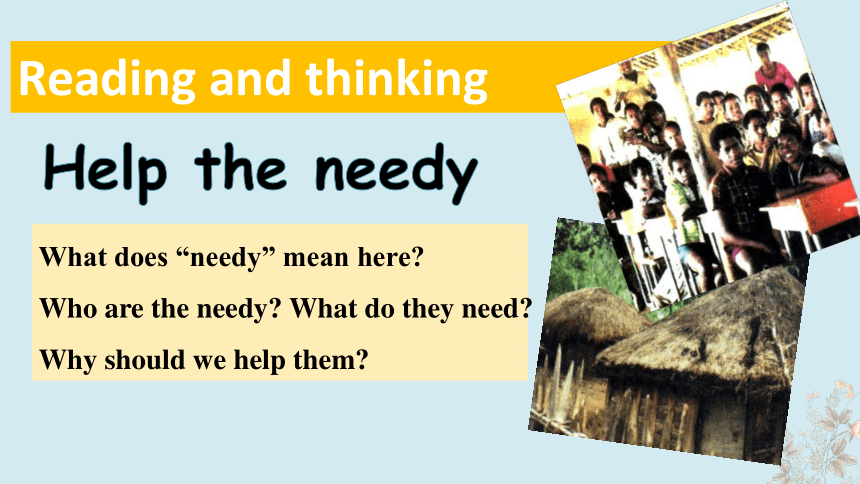
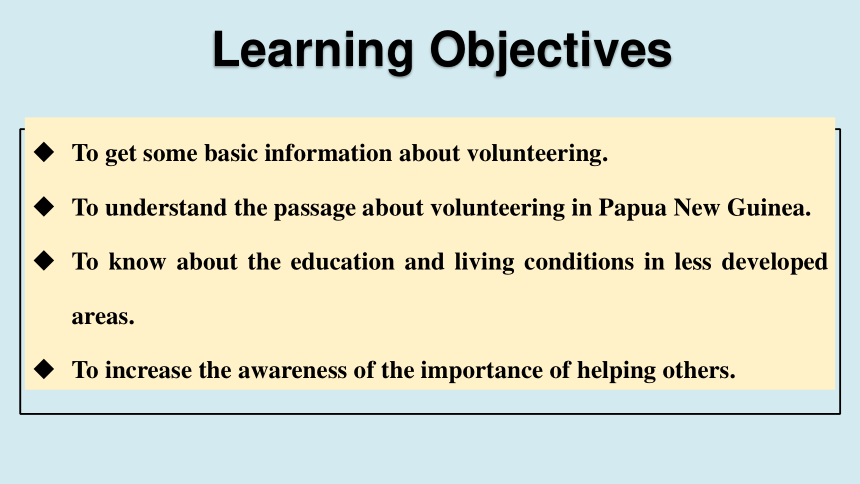
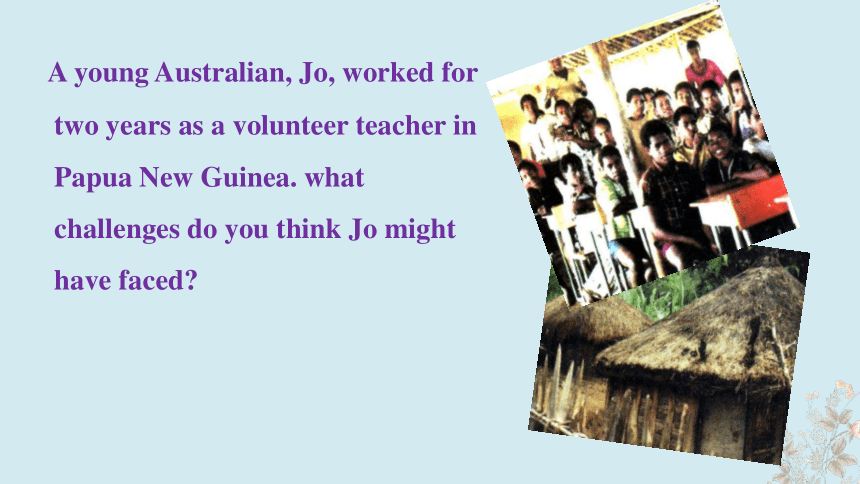
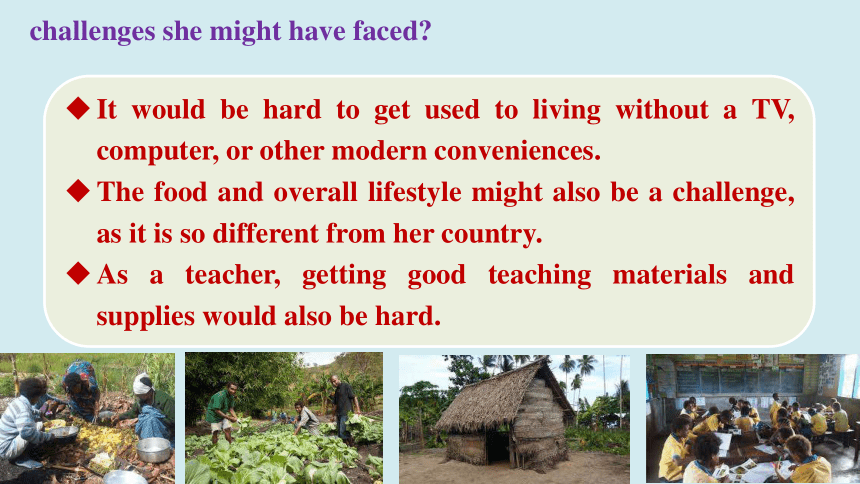
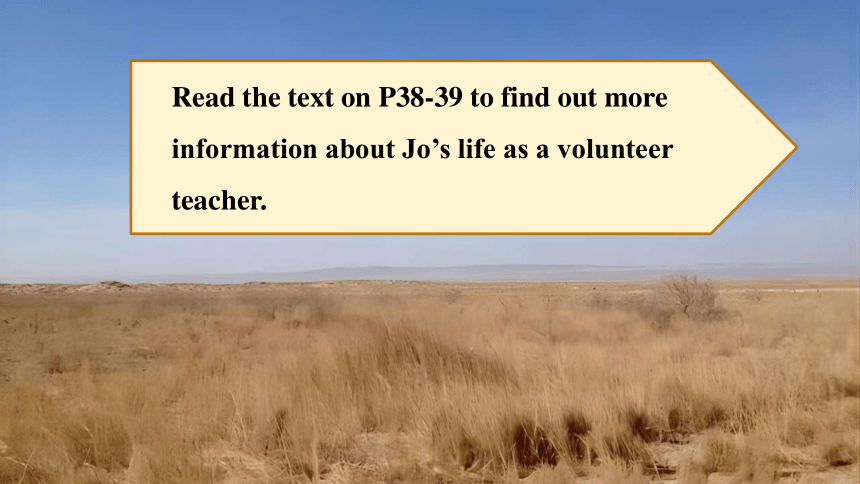
文档简介
(共37张PPT)
In this unit, you will
1 read about volunteering in Papua New Guinea.
2 hear and talk about types of volunteering and organisations.
3 give a speech about China‘s aid to other countries.
4 learn about volunteers at home and abroad.
Unit4 SHARING
As you grow older, you will discover that you have two hands, one for helping yourself, the other for helping others.
–Sam Levenson
Look and discuss
1. What do you think is happening in the photo
2.Share your experiences as a volunteer, if you have any.
What do you think is happening in the photo
Look and discuss
Some young people in Africa are enjoying water at a new well which was provided by China
Background information
The well, which was dug in 2016, was part of a Chinese government aid initiative to dig 1,000 wells in Ghana as part of the Belt and Road Initiative.
The shortage of water is one of major issues in Africa.
First ,there is often not enough water to grow crops, leading to famine饥荒; and the water that can be found is often filled with viruses, bacteri, making it unsafe for drinking, yet people drink it anyway.
second, Traditionally, in Africa, women or girls are responsible for fetching the water. they may have to walk several kilometres to fetch the water, which means that wives do not have time to earn money, and that girls have no time to go to school.
The existence of a well in such a place will provide plenty of easy-to- access, safe, and clean water and will free up women and girls.
A well can be a life- changing resource to a small village.
Volunteering to dig a well is important
Share your experiences as a volunteer, if you have any.
Example
I spent a summer volunteering to help feed homeless people. It was a wonderful but busy time. Though the work was quite hard, I felt good about my contribution to society and my role in helping others.
How do you understand this quote
In context, the quote means that we should take care of ourselves, and that we should take care of others in an equal fashion.
随着年龄的增长,你会发现你有两只手,一只帮助自己,另一只帮助别人。
——山姆·莱文森
As you grow older, you will discover that you have two hands, one for helping yourself, the other for helping others.
—Sam Levenson
Help the needy
What does “needy” mean here
Who are the needy What do they need
Why should we help them
Reading and thinking
Learning Objectives
To get some basic information about volunteering.
To understand the passage about volunteering in Papua New Guinea.
To know about the education and living conditions in less developed areas.
To increase the awareness of the importance of helping others.
A young Australian, Jo, worked for two years as a volunteer teacher in Papua New Guinea. what challenges do you think Jo might have faced
It would be hard to get used to living without a TV, computer, or other modern conveniences.
The food and overall lifestyle might also be a challenge, as it is so different from her country.
As a teacher, getting good teaching materials and supplies would also be hard.
challenges she might have faced
Read the text on P38-39 to find out more information about Jo’s life as a volunteer teacher.
Reading strategy: adjust reading speed
When reading a passage, adjust your speed to get the most out of it. If the material is easy or familiar, you can read through it quickly. If it is difficult or contains useful details, read it a bit slower and try to understand more.
Skim
What is the text type
Two blog entries.
Skim the text and complete the main idea.
The text consists of __________________. It mainly is about Jo’s experience of _____________________at a bush school and ____________to a local family in Papua New Guinea. She also shared her __________________to her voluntary work, the people, and the life there.
2 blog entries
voluntary teaching
a visit
feelings and attitudes
What do you think “the bush” mean
2. What has been Jo’s most challenging subject to teach
Why
3. What did Jo notice about the homes in the village she
visited
4. What did Jo notice after the meal
5. What is Jo’s general impression of the place and people there
Answer the following questions.
I just got a parcel from home! It took about two weeks to arrive, and it was a bit damaged, but it was so nice to get some sweets and jam from home; I’ve been dying to have some of my favourite sweets, and it’s always nice to get mail!
So I’ve been here in the jungle for about a month now. My secondary school is a bush school. The classrooms are made of bamboo, with clay floors and roofs of grass. It takes me only a few minutes to walk to school down a dusty track covered in weeds. When I reach the school grounds, I’m greeted by a chorus of “good morning” from the boys. Unlike students in our country, these boys do not wear cotton uniforms, and many of them also have to walk a long way, sometimes for up to two hours, just to get to school.
Topic: VOLUNTEERING IN THE BUSH
1.What do you think “the bush” means
A wilderness area
Blog 1 Para 1-2
There’s no electricity, running water or even textbooks, not to mention laptops, tablets, or other modern devices! All the students have are pencils, rubbers, and paper. I’m still trying to adapt to these conditions. I’ve had to become much more imaginative in my teaching. Science is my most challenging subject as my students have no concept of doing experiments. There is no equipment, and since there isn’t even a washroom, if I need water I have to carry it from my house in a basin! It’s important not to be too rigid about rules here, too. The other day I was showing the boys a chemistry experiment when, before I knew it, the mixture was bubbling out of the test tube spilling everywhere! The class became a circus as the boys, who had never come across anything like this before, started jumping out of the windows. Sometimes I wonder how relevant chemistry is to these students — few will ever become chemists — and most will be going back to their villages after Year 8 anyway. To be honest, I doubt whether I’m making any difference to these boys’ lives at all.
Blog 1 Para 3
2.What has been Jo’s most challenging subject to teach Why
Last weekend I made my first visit to a remote village, home to one of our students, Tombe. Another teacher and I walked for two and a half hours to get there — first, up a mountain from where we had fantastic views, and then down a shaded path to the valley below. When we arrived at the village, Tombe’s mother, Kiak, saw us coming and started crying “ieee ieee”. We shook hands with all the villagers. Everyone seemed to be related to Tombe.
Tombe’s father, Mukap, a man with a strong jaw and a wrinkled forehead, led us to his house, a low, round bamboo hut with no windows, with a door just big enough to get through, and with grass sticking out of the roof — this shows it is a man’s house. Such housing is dark inside so it took time for our eyes to adjust. Fresh grass had been laid on the floor and there was a platform for Jenny and me to sleep on. There was a fireplace in the centre of the hut. The only possessions I could see were one broom, a few saucers, a kettle, cups, pans, and a couple of jars.
Blog 2 Para 1-2
3.What did Jo notice about the homes in the village she visited
Mukap built a fire outside and laid stones on it to heat. He then placed the hot stones in an empty oil drum with kau kau (sweet potato), ripe corn, and greens. He then covered the vegetables with banana leaves and left them to steam. It smelled delicious. We ate inside the hut sitting round the fire. I loved listening to the family talking softly to each other in their language, even though I could not participate much in the conversation. Luckily, Tombe interpreted for us.
Later, I noticed a can standing upside down on the grill over the fire. After a while, Tombe threw it out of the doorway. Tombe told me that the can was heated to dry out the leftover food. His family believes that leftovers attract bad spirits in the night, so any leftover food is dried up in a can and the can is then thrown out of the hut.
We left the village the next morning after many goodbyes and firm handshakes. My muscles were aching and my knees shaking as we dragged ourselves down the mountain towards home. That evening I fell happily into bed. It was such a privilege to have spent a day with Tombe’s family.
Blog 2 Para 3-5
4.What did Jo notice after the meal
Mukap built a fire outside and laid stones on it to heat. He then placed the hot stones in an empty oil drum with kau kau (sweet potato), ripe corn, and greens. He then covered the vegetables with banana leaves and left them to steam. It smelled delicious. We ate inside the hut sitting round the fire. I loved listening to the family talking softly to each other in their language, even though I could not participate much in the conversation. Luckily, Tombe interpreted for us.
Later, I noticed a can standing upside down on the grill over the fire. After a while, Tombe threw it out of the doorway. Tombe told me that the can was heated to dry out the leftover food. His family believes that leftovers attract bad spirits in the night, so any leftover food is dried up in a can and the can is then thrown out of the hut.
We left the village the next morning after many goodbyes and firm handshakes. My muscles were aching and my knees shaking as we dragged ourselves down the mountain towards home. That evening I fell happily into bed. It was such a privilege to have spent a day with Tombe’s family.
Blog 2 Para 3-5
5.What is Jo’s general impression of the place and people there
Education Condition
Classrooms are made of ________, and floors and roofs are made of_______________.
On the way to school is a ___________________.
Students do not wear _______________.
There is no ___________, _______________ or ________in the school, students only have_________________________ .
bamboo
clay and grass
dusty track in weeds
cotton uniforms
electricity
running water
textbooks
pencils, rubbers and paper
________is the most challenging subject because these students have no concept of ________________.
The classroom became a circus because ________________________________________________________________________________________________
Science
doing experiments
These students have no experience of chemistry experiment and they are a bit frightened.
Living Condition
On the way to a remote village, we up a ________ and then down a ___________ to the valley below.
Tombe’s house is a low, round____________, with ___________, and with ______ sticking out of the roof.
There are __________ on the floor and a ________ in the centre of the hut.
mountain
shaded path
grass
bamboo hut
fresh grass
fireplace
no windows
Living Condition
The only possessions in the room are_________ , a few _________, a _______ and so on.
People there cook some vegetables and cover them with______________ and left them to _____.
one broom
banana leaves
saucers
kettle
steam
Analyse Jo’s impressions of life in the village she visited. (P39 E4)
Read for information
Positive aspect Negative aspect
The students value education No running water or electricity
Able to get mail
Take only a few minutes to walk to school
The students are friendly
Fantastic scenery
Nice people
Interesting culture
No textbooks or supplies
The students have no concept of doing experiments
No washroom
The students may not be able to use what they have learnt
Have to walk a long distance to go anywhere
No beds, few possessions
1. Jo felt it was a privilege to have spent a day with Tombe’s family.
If you were Jo, how do you think you would have felt Why
2. What are the differences between the school you go to and the one
described in the passage
3. Would you like to become a volunteer teacher Why or why not
In groups, discuss these questions.
Jo felt it was a privilege to have spent a day with Tombe’s family. If you were Jo, how do you think you would have felt Why
If I were Jo, I would have felt privileged as well, as it was a rare chance to glimpse into another culture that most people will never have.
2. What are the differences between the school you go to
and the one described in the passage
I go to a school that has all the conveniences of modern society, so there is no comparison at all. We have plenty of equipment and supplies, comfortable chairs, air conditioning, computers, etc.
3. Would you like to be a volunteer teacher Why or why
not
I think it would be interesting to do that for a while. It would be a good opportunity to make a difference to someone else’s life, and also to learn about a new culture.
As a senior student, what can we do to help the needy
Critical Thinking
Possible version:
1. We can make friends with them.
2. We can donate money to them.
3. We can contribute books to them.
4.We can donate food to them.
5. We can donate clothes to them.
As individuals, we can volunteer……
As a nation
China has been making contributions to the less developed countries.
build railways
build roads
provide medical care
dig wells for Africans
Therefore, the whole world is a big family.
Together for a shared future!
To practice the idea of community of common destiny for mankind.
Sharing is helping
Sharing is giving
Sharing is understanding
Sharing is love
Roses given, fragrance in hand.
Homework
Search for some information about China’s aid to other countries and the International Volunteer Project and write a short essay about your views on being a volunteer teacher.
THANKS
In this unit, you will
1 read about volunteering in Papua New Guinea.
2 hear and talk about types of volunteering and organisations.
3 give a speech about China‘s aid to other countries.
4 learn about volunteers at home and abroad.
Unit4 SHARING
As you grow older, you will discover that you have two hands, one for helping yourself, the other for helping others.
–Sam Levenson
Look and discuss
1. What do you think is happening in the photo
2.Share your experiences as a volunteer, if you have any.
What do you think is happening in the photo
Look and discuss
Some young people in Africa are enjoying water at a new well which was provided by China
Background information
The well, which was dug in 2016, was part of a Chinese government aid initiative to dig 1,000 wells in Ghana as part of the Belt and Road Initiative.
The shortage of water is one of major issues in Africa.
First ,there is often not enough water to grow crops, leading to famine饥荒; and the water that can be found is often filled with viruses, bacteri, making it unsafe for drinking, yet people drink it anyway.
second, Traditionally, in Africa, women or girls are responsible for fetching the water. they may have to walk several kilometres to fetch the water, which means that wives do not have time to earn money, and that girls have no time to go to school.
The existence of a well in such a place will provide plenty of easy-to- access, safe, and clean water and will free up women and girls.
A well can be a life- changing resource to a small village.
Volunteering to dig a well is important
Share your experiences as a volunteer, if you have any.
Example
I spent a summer volunteering to help feed homeless people. It was a wonderful but busy time. Though the work was quite hard, I felt good about my contribution to society and my role in helping others.
How do you understand this quote
In context, the quote means that we should take care of ourselves, and that we should take care of others in an equal fashion.
随着年龄的增长,你会发现你有两只手,一只帮助自己,另一只帮助别人。
——山姆·莱文森
As you grow older, you will discover that you have two hands, one for helping yourself, the other for helping others.
—Sam Levenson
Help the needy
What does “needy” mean here
Who are the needy What do they need
Why should we help them
Reading and thinking
Learning Objectives
To get some basic information about volunteering.
To understand the passage about volunteering in Papua New Guinea.
To know about the education and living conditions in less developed areas.
To increase the awareness of the importance of helping others.
A young Australian, Jo, worked for two years as a volunteer teacher in Papua New Guinea. what challenges do you think Jo might have faced
It would be hard to get used to living without a TV, computer, or other modern conveniences.
The food and overall lifestyle might also be a challenge, as it is so different from her country.
As a teacher, getting good teaching materials and supplies would also be hard.
challenges she might have faced
Read the text on P38-39 to find out more information about Jo’s life as a volunteer teacher.
Reading strategy: adjust reading speed
When reading a passage, adjust your speed to get the most out of it. If the material is easy or familiar, you can read through it quickly. If it is difficult or contains useful details, read it a bit slower and try to understand more.
Skim
What is the text type
Two blog entries.
Skim the text and complete the main idea.
The text consists of __________________. It mainly is about Jo’s experience of _____________________at a bush school and ____________to a local family in Papua New Guinea. She also shared her __________________to her voluntary work, the people, and the life there.
2 blog entries
voluntary teaching
a visit
feelings and attitudes
What do you think “the bush” mean
2. What has been Jo’s most challenging subject to teach
Why
3. What did Jo notice about the homes in the village she
visited
4. What did Jo notice after the meal
5. What is Jo’s general impression of the place and people there
Answer the following questions.
I just got a parcel from home! It took about two weeks to arrive, and it was a bit damaged, but it was so nice to get some sweets and jam from home; I’ve been dying to have some of my favourite sweets, and it’s always nice to get mail!
So I’ve been here in the jungle for about a month now. My secondary school is a bush school. The classrooms are made of bamboo, with clay floors and roofs of grass. It takes me only a few minutes to walk to school down a dusty track covered in weeds. When I reach the school grounds, I’m greeted by a chorus of “good morning” from the boys. Unlike students in our country, these boys do not wear cotton uniforms, and many of them also have to walk a long way, sometimes for up to two hours, just to get to school.
Topic: VOLUNTEERING IN THE BUSH
1.What do you think “the bush” means
A wilderness area
Blog 1 Para 1-2
There’s no electricity, running water or even textbooks, not to mention laptops, tablets, or other modern devices! All the students have are pencils, rubbers, and paper. I’m still trying to adapt to these conditions. I’ve had to become much more imaginative in my teaching. Science is my most challenging subject as my students have no concept of doing experiments. There is no equipment, and since there isn’t even a washroom, if I need water I have to carry it from my house in a basin! It’s important not to be too rigid about rules here, too. The other day I was showing the boys a chemistry experiment when, before I knew it, the mixture was bubbling out of the test tube spilling everywhere! The class became a circus as the boys, who had never come across anything like this before, started jumping out of the windows. Sometimes I wonder how relevant chemistry is to these students — few will ever become chemists — and most will be going back to their villages after Year 8 anyway. To be honest, I doubt whether I’m making any difference to these boys’ lives at all.
Blog 1 Para 3
2.What has been Jo’s most challenging subject to teach Why
Last weekend I made my first visit to a remote village, home to one of our students, Tombe. Another teacher and I walked for two and a half hours to get there — first, up a mountain from where we had fantastic views, and then down a shaded path to the valley below. When we arrived at the village, Tombe’s mother, Kiak, saw us coming and started crying “ieee ieee”. We shook hands with all the villagers. Everyone seemed to be related to Tombe.
Tombe’s father, Mukap, a man with a strong jaw and a wrinkled forehead, led us to his house, a low, round bamboo hut with no windows, with a door just big enough to get through, and with grass sticking out of the roof — this shows it is a man’s house. Such housing is dark inside so it took time for our eyes to adjust. Fresh grass had been laid on the floor and there was a platform for Jenny and me to sleep on. There was a fireplace in the centre of the hut. The only possessions I could see were one broom, a few saucers, a kettle, cups, pans, and a couple of jars.
Blog 2 Para 1-2
3.What did Jo notice about the homes in the village she visited
Mukap built a fire outside and laid stones on it to heat. He then placed the hot stones in an empty oil drum with kau kau (sweet potato), ripe corn, and greens. He then covered the vegetables with banana leaves and left them to steam. It smelled delicious. We ate inside the hut sitting round the fire. I loved listening to the family talking softly to each other in their language, even though I could not participate much in the conversation. Luckily, Tombe interpreted for us.
Later, I noticed a can standing upside down on the grill over the fire. After a while, Tombe threw it out of the doorway. Tombe told me that the can was heated to dry out the leftover food. His family believes that leftovers attract bad spirits in the night, so any leftover food is dried up in a can and the can is then thrown out of the hut.
We left the village the next morning after many goodbyes and firm handshakes. My muscles were aching and my knees shaking as we dragged ourselves down the mountain towards home. That evening I fell happily into bed. It was such a privilege to have spent a day with Tombe’s family.
Blog 2 Para 3-5
4.What did Jo notice after the meal
Mukap built a fire outside and laid stones on it to heat. He then placed the hot stones in an empty oil drum with kau kau (sweet potato), ripe corn, and greens. He then covered the vegetables with banana leaves and left them to steam. It smelled delicious. We ate inside the hut sitting round the fire. I loved listening to the family talking softly to each other in their language, even though I could not participate much in the conversation. Luckily, Tombe interpreted for us.
Later, I noticed a can standing upside down on the grill over the fire. After a while, Tombe threw it out of the doorway. Tombe told me that the can was heated to dry out the leftover food. His family believes that leftovers attract bad spirits in the night, so any leftover food is dried up in a can and the can is then thrown out of the hut.
We left the village the next morning after many goodbyes and firm handshakes. My muscles were aching and my knees shaking as we dragged ourselves down the mountain towards home. That evening I fell happily into bed. It was such a privilege to have spent a day with Tombe’s family.
Blog 2 Para 3-5
5.What is Jo’s general impression of the place and people there
Education Condition
Classrooms are made of ________, and floors and roofs are made of_______________.
On the way to school is a ___________________.
Students do not wear _______________.
There is no ___________, _______________ or ________in the school, students only have_________________________ .
bamboo
clay and grass
dusty track in weeds
cotton uniforms
electricity
running water
textbooks
pencils, rubbers and paper
________is the most challenging subject because these students have no concept of ________________.
The classroom became a circus because ________________________________________________________________________________________________
Science
doing experiments
These students have no experience of chemistry experiment and they are a bit frightened.
Living Condition
On the way to a remote village, we up a ________ and then down a ___________ to the valley below.
Tombe’s house is a low, round____________, with ___________, and with ______ sticking out of the roof.
There are __________ on the floor and a ________ in the centre of the hut.
mountain
shaded path
grass
bamboo hut
fresh grass
fireplace
no windows
Living Condition
The only possessions in the room are_________ , a few _________, a _______ and so on.
People there cook some vegetables and cover them with______________ and left them to _____.
one broom
banana leaves
saucers
kettle
steam
Analyse Jo’s impressions of life in the village she visited. (P39 E4)
Read for information
Positive aspect Negative aspect
The students value education No running water or electricity
Able to get mail
Take only a few minutes to walk to school
The students are friendly
Fantastic scenery
Nice people
Interesting culture
No textbooks or supplies
The students have no concept of doing experiments
No washroom
The students may not be able to use what they have learnt
Have to walk a long distance to go anywhere
No beds, few possessions
1. Jo felt it was a privilege to have spent a day with Tombe’s family.
If you were Jo, how do you think you would have felt Why
2. What are the differences between the school you go to and the one
described in the passage
3. Would you like to become a volunteer teacher Why or why not
In groups, discuss these questions.
Jo felt it was a privilege to have spent a day with Tombe’s family. If you were Jo, how do you think you would have felt Why
If I were Jo, I would have felt privileged as well, as it was a rare chance to glimpse into another culture that most people will never have.
2. What are the differences between the school you go to
and the one described in the passage
I go to a school that has all the conveniences of modern society, so there is no comparison at all. We have plenty of equipment and supplies, comfortable chairs, air conditioning, computers, etc.
3. Would you like to be a volunteer teacher Why or why
not
I think it would be interesting to do that for a while. It would be a good opportunity to make a difference to someone else’s life, and also to learn about a new culture.
As a senior student, what can we do to help the needy
Critical Thinking
Possible version:
1. We can make friends with them.
2. We can donate money to them.
3. We can contribute books to them.
4.We can donate food to them.
5. We can donate clothes to them.
As individuals, we can volunteer……
As a nation
China has been making contributions to the less developed countries.
build railways
build roads
provide medical care
dig wells for Africans
Therefore, the whole world is a big family.
Together for a shared future!
To practice the idea of community of common destiny for mankind.
Sharing is helping
Sharing is giving
Sharing is understanding
Sharing is love
Roses given, fragrance in hand.
Homework
Search for some information about China’s aid to other countries and the International Volunteer Project and write a short essay about your views on being a volunteer teacher.
THANKS
